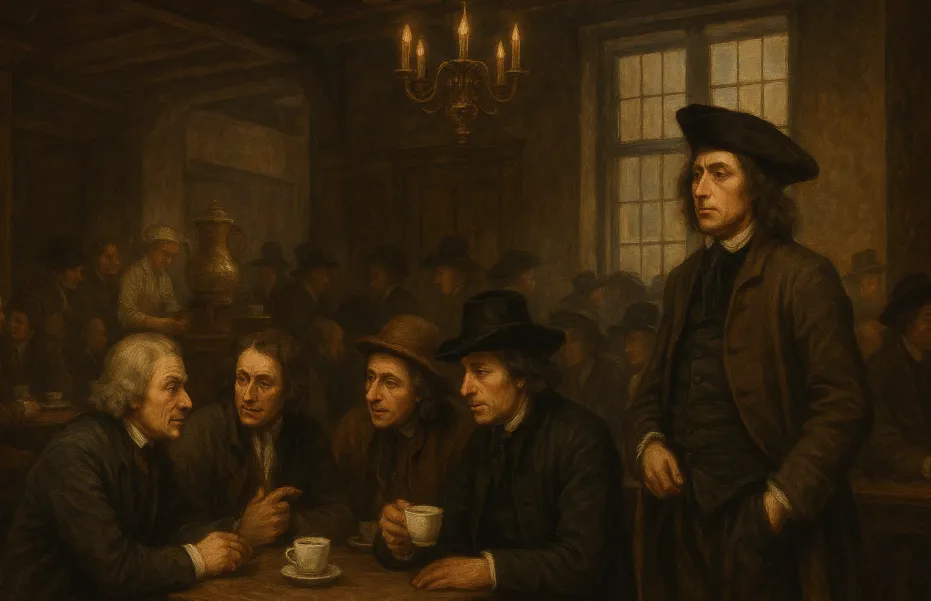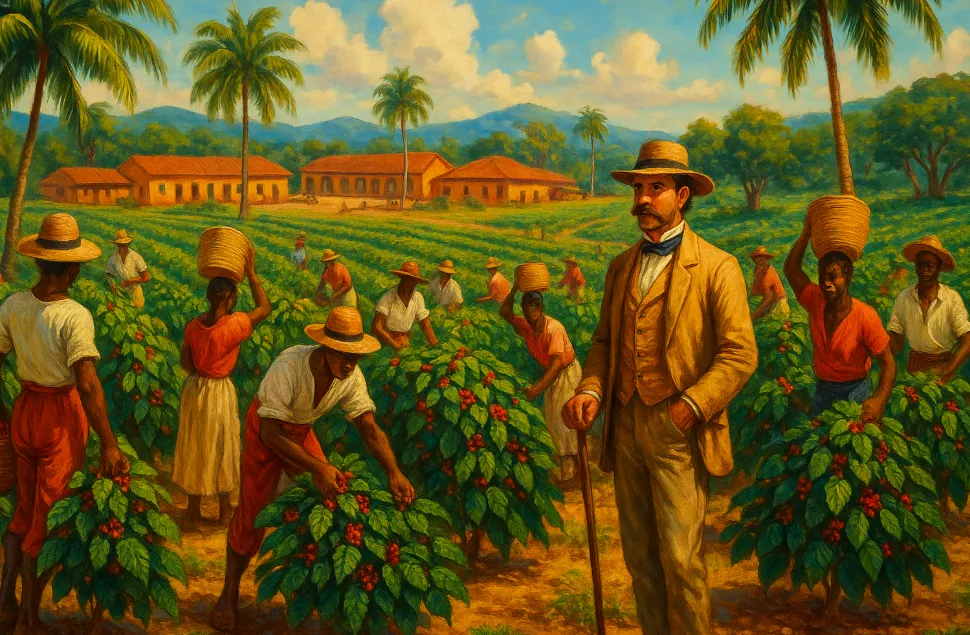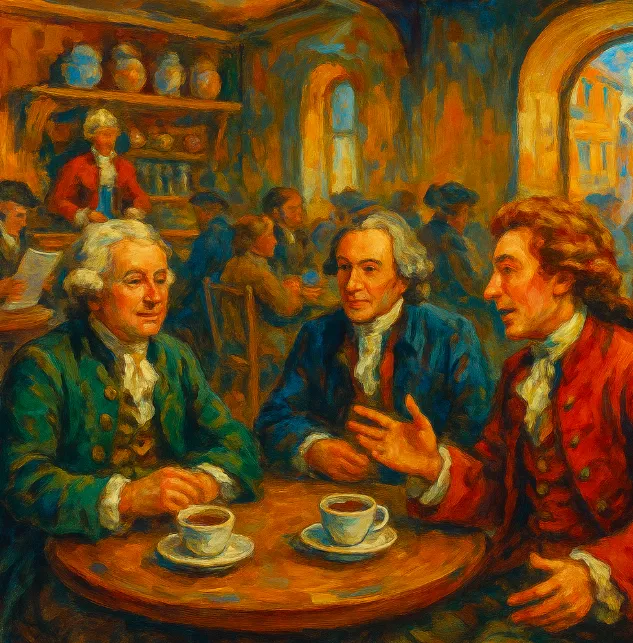Coffee Houses History: How Penny Universities Shaped Modern Society
Explore how 17th century coffee houses became intellectual centers, earned the nickname 'penny universities,' and fostered the Enlightenment. Discover coffee house history in England, their role in business, politics, and social change.
- Coffee Basics Nerds
- 6 min read

Coffee Houses: The “Penny Universities” That Revolutionized Society
The emergence of coffee houses history in 17th-century Europe represents one of the most significant social innovations in human history. These establishments, nicknamed “penny universities” for their role in democratizing knowledge, became the birthplace of modern intellectual discourse, business networking, and social movements that would reshape civilization itself.
Following coffee’s journey from Ethiopian origins through Ottoman trade routes to Europe, coffee houses provided the perfect venue for this revolutionary beverage to transform society on an unprecedented scale.

What Made Coffee Houses Revolutionary?
Coffee houses England history shows these weren’t just places to drink coffee - they were social laboratories where traditional hierarchies dissolved and new forms of human interaction emerged.
The Democratic Innovation
Unlike any previous social space, 17th century coffee houses offered something unprecedented:
- Social equality: Anyone who could afford a penny cup could participate in discussions
- Cross-class interaction: Merchants, nobles, laborers, and intellectuals mingled freely
- Meritocratic discourse: Ideas mattered more than social status
- Inclusive accessibility: Lower barriers to entry than exclusive clubs or universities
Why “Penny Universities”?
The penny universities coffee houses nickname emerged because:
- Affordable education: For the price of coffee, patrons accessed knowledge and debate
- Diverse learning: Exposure to ideas from multiple fields and perspectives
- Practical education: Real-world business and political discussions
- Democratic knowledge: Information previously restricted to elite institutions
Coffee Houses vs Traditional Social Spaces

| Coffee Houses | Traditional Taverns |
|---|---|
| Sober, focused atmosphere | Alcohol-influenced behavior |
| Intellectual conversation | Entertainment-focused |
| News and information sharing | Local gossip and stories |
| Business networking | Social drinking |
| Cross-class interaction | Class-segregated spaces |
| Written materials available | Primarily oral communication |
This coffee house social history transformation created entirely new possibilities for human interaction and knowledge exchange.
The Birth of Modern Business Culture
Lloyd’s of London: From Coffee House to Global Institution

Coffee houses history England includes the remarkable story of Edward Lloyd’s coffee house, which became Lloyd’s of London - still the world’s leading insurance marketplace.
Lloyd’s Coffee House Evolution:
- 1688: Edward Lloyd opens coffee house near London’s docks
- Maritime focus: Ship captains, merchants, and insurers gather regularly
- Information exchange: Shipping news, cargo manifests, and risk assessments shared
- Insurance innovation: Informal insurance agreements formalized into modern insurance industry
- Global impact: Foundation for international maritime commerce
Stock Exchange Origins
Multiple coffee houses England served as birthplaces for financial innovation:
- Jonathan’s Coffee House: Became London Stock Exchange
- Garraway’s Coffee House: Commodity trading center
- Jerusalem Coffee House: East India Company business hub
- Commercial networking: Business relationships formed over coffee rather than alcohol
Political and Social Movement Centers
The Enlightenment Connection
Coffee house culture provided the perfect environment for Enlightenment coffee houses to flourish:
Intellectual Characteristics:
- Reason over authority: Ideas evaluated on merit rather than source
- Open debate: Controversial topics discussed freely
- Scientific discourse: Natural philosophy and scientific method promoted
- Political philosophy: Government theories and social contracts debated
- Religious tolerance: Diverse theological perspectives shared respectfully
Revolutionary Ideas Born Over Coffee
Key movements that emerged from coffee house discussions:
- Democratic theory: Concepts of representative government and individual rights
- Scientific revolution: Research findings shared and debated
- Economic theory: Early capitalism and free market concepts
- Social reform: Women’s rights, abolition, and labor rights discussions
- Journalistic innovation: Newspapers and pamphlets distributed and discussed
Regional Coffee House Variations
London: The Coffee House Capital
Coffee houses history England shows London led the world with over 3,000 coffee houses by 1700:
Specialized Coffee Houses:
- Literary coffee houses: Writers, poets, and critics gathering
- Political coffee houses: Whigs and Tories maintaining separate establishments
- Professional coffee houses: Lawyers, doctors, and clergy meeting spaces
- Merchant coffee houses: Trade-specific business networking
Paris: Café Culture Emerges
French coffee house development:
- Café Procope: Oldest café in Paris, intellectual gathering place
- Revolutionary planning: French Revolution ideas developed in cafés
- Artistic culture: Writers and artists creating café intellectual culture
- Gender inclusion: More female participation than English coffee houses
Vienna: Coffee House Elegance
Austrian coffee house culture:
- Refined atmosphere: More formal, elegant social environment
- Newspaper reading: Coffee houses as news consumption centers
- Chess and games: Intellectual games alongside conversation
- Musical culture: Composers and musicians gathering spaces
The Decline and Evolution of Traditional Coffee Houses
Why Original Coffee Houses Disappeared
By the mid-18th century, traditional penny universities coffee houses declined due to:
- Institutional replacement: Universities, clubs, and professional associations took over functions
- Newspaper growth: Print media reduced need for oral news exchange
- Social specialization: Society became more compartmentalized by class and profession
- Regulatory changes: Government licensing and taxation increased
Modern Legacy
Coffee house social history influences continue today:
- Café culture: Modern coffee shops echo original social functions
- Co-working spaces: Contemporary versions of business networking
- Internet cafés: Digital age information exchange centers
- Third places: Social spaces between home and work
Cultural and Intellectual Impact
Knowledge Democratization
Intellectual coffee house movement achievements:
- Information accessibility: Breaking elite monopoly on knowledge
- Skill development: Public speaking, debate, and critical thinking
- Network building: Social and professional connections across class lines
- Cultural exchange: Ideas flowing between different communities and backgrounds
Scientific and Technological Advancement
Coffee houses accelerated progress through:
- Research sharing: Scientists presenting findings to diverse audiences
- Practical application: Theoretical ideas tested against real-world experience
- Collaboration: Cross-disciplinary partnerships forming naturally
- Innovation funding: Investors meeting inventors in coffee house settings
The Coffee House Legacy in Modern Society
Contemporary Parallels
Today’s social media, co-working spaces, and café culture all trace roots to 17th century coffee houses:
- Democratic participation: Social media as modern “penny universities”
- Information exchange: Digital platforms continuing coffee house information sharing
- Business networking: Professional social media and networking events
- Social movements: Online communities organizing like coffee house political groups
Lessons for Modern Society
Coffee house history teaches valuable lessons about:
- Inclusive spaces: How diverse participation improves decision-making
- Informal education: Learning outside traditional institutional structures
- Cross-cultural exchange: Benefits of bringing different perspectives together
- Social innovation: How new social spaces can drive cultural change
The Enduring Power of Coffee and Conversation
The coffee houses social and intellectual hubs of the 17th and 18th centuries demonstrate coffee’s unique power to facilitate human connection and intellectual exchange. From traditional brewing methods to revolutionary social spaces, coffee has consistently served as a catalyst for human progress.
Understanding penny universities coffee houses helps us appreciate how simple concepts - affordable beverages, comfortable spaces, and open dialogue - can fundamentally transform society. These historical lessons remain relevant as we design modern spaces for collaboration, learning, and social interaction.
The journey from coffee houses to modern café culture shows how the best social innovations adapt to changing times while preserving core values of accessibility, diversity, and intellectual freedom.
Explore more of coffee’s transformative history with our guides to early brewing innovations and how colonialism shaped global coffee production.
You might also like:
- Tags:
- Coffee Houses History
- Penny Universities Coffee Houses
- Coffee House Social History
- Coffee Houses England History
- Enlightenment Coffee Houses
- 17th Century Coffee Houses
- Coffee House Culture
- Intellectual Coffee House Movement
- Coffee Production
- Brewing Methods
- Global Coffee
- Modern Coffee
- Social Media
- Real World
- Coffee Houses
- Decision Making
- Coffee House
- Coffee Unique
- Coffee Key
- Coffee Journey
- Traditional Brewing
- House Culture